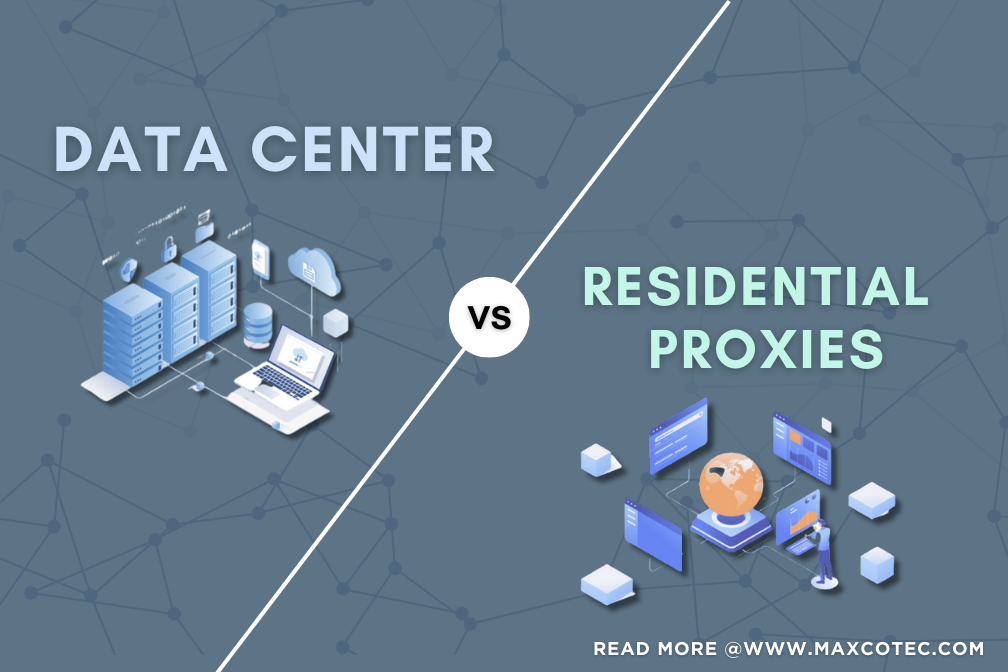Nearly every internet user feels the need at some point to access content or services that are strictly banned in their geographic region. This purpose has given rise to the use of proxy servers among both individuals and businesses all across the world. A proxy server serves as an intermediary between a client and a user. It routes web traffic through servers and enables users to visit websites safely, anonymously, and privately.
There are several proxies available online to serve various business purposes, including residential and datacenter proxies. Both residential and datacenter proxy servers offer a way of hiding your IP address, but which one is the best choice for you? Get Complete Guide at Tech Blogs in USA.
Let’s delve deeper into what residential and datacenter proxies are, their pros and cons, and their main use cases.
Residential Proxies – What Are They?

A residential proxy is a type of proxy server that serves as an intermediary between users and web servers, preventing the real IP of a user from getting revealed. These proxies specifically pass their traffic through residential IP addresses that are registered under a residential internet service provider (ISP) offering services to consumers.
Residential proxies are useful for a variety of reasons. First, these proxies enable users to access sites and services that are blocked in some geographic regions since they assign users a local IP address. The next advantage of using residential proxy servers is higher privacy. Users get a different IP address, which makes it highly difficult to track their identity and activity.
Coming to the drawbacks, residential proxies tend to be slower in speed than other types of proxy servers. This is because they use real IPs and follow the same route as normal users. Furthermore, these proxies are limited in availability, and some countries may have legal implications for using them.
Static Residential Proxies
Static residential proxies assign a static residential IP address to the user that remains unique for a long period of time. These proxies are linked to a single IP which doesn’t change throughout online activities.
Several companies operating in the market appreciate static residential IPs for their speed. In addition, these IP addresses are cheaper than other types and offer a high degree of legitimacy and anonymity in the digital space.
However, a major downside of static residential proxies is that they can be easily detected by websites that have installed anti-scraping mechanisms. Since these proxies can get restricted or blocked at times from accessing online locations, static proxy servers are also less reliable for projects demanding powerful resources.
Discover the possibilities and bring your stories to life with the help of this powerful AI tool. Learn How to Use Beta Character AI?
Datacenter Proxies – What Are They?

A datacenter (DC) proxy is an intermediary between a device accessing the web and the site getting visited. These proxy servers assign users IP addresses that come from datacenter proxy pools and third-party cloud service vendors. Datacenter proxies are not associated with an internet service provider (ISP) and provide users with full anonymity and private IP authentication.
Types of Datacenter Proxies
Datacenter proxy servers are divided into two groups depending on the number of clients who share an IP address.
Shared Datacenter Proxy
A shared datacenter proxy provides an IP address that is used by multiple users simultaneously. When a user makes a request to a web server in another country, this proxy server assigns the client a random IP address from the shared proxy pool related to the target destination.
This proxy is more cost-effective than its other type as it assigns the same IP address to multiple users. Clients share the same bandwidth to exchange data between devices while using shared datacenter proxy servers. Shared bandwidth impacts the data transfer and browsing speed. Additionally, an increase in the number of clients sharing the same IP can overburden the IP address.
Dedicated Datacenter Proxy
Dedicated or private datacenter proxies are not used or shared with other clients. These proxy servers assign a specific IP address to a user from the target location, which can be used only by a single user. Unlike its other type, a dedicated datacenter proxy offers stable speed and performance.
However, these proxies can prove to be ineffective for tougher target websites. They are more prone to bans and blacklisting as well.
Boost your Instagram game with Display Purposes, the ultimate hashtag generator for 2023. Discover the best hashtags to increase your reach, engagement, and followers. Display Purposes – The Best Instagram Hashtag Generator in 2023
Use Cases of Residential and Datacenter Proxies

Each proxy offers a range of benefits to its users. Here are the common applications of both residential and datacenter proxy servers:
Market Research
In addition to residential proxies, datacenter is the prime choice of many companies when it comes to operating market research tools, like a scraper. These proxies help companies scrape data like product prices, emerging news stories, or development on rival websites.
Circumvention of Geo-restrictions
Though datacenter proxies can also bypass geographical restrictions, residential IPs are more reliable due to their provision of a real IP address. Real residential IPs can imitate organic user behavior and bypass different web scraping challenges, such as CAPTCHAs, geo-restrictions, and IP bans.
Ad Verification
With both datacenter and residential proxies, companies can safely trawl the web for their ads and acquire accurate data on who sees them and where. They can also ensure their reputation by searching where their ads appear and removing them that appear on unsuitable pages. These proxies, datacenter, in particular, help detect malicious activities like click fraud as well.
Review Monitoring
Both residential and datacenter proxies are ideal for extracting huge amounts of review data from websites. Companies use these proxies to gather customer reviews and improve their services and products based on different factors. They get information about current and potential customers about their offerings and uniqueness.
Final Thoughts
Both residential and datacenter proxy servers hide and protect your IP address, but the former is more secure since the sites you visit find it harder to detect them. Still, that doesn’t indicate that datacenter proxies are not worthy of getting considered. Get in touch with the right provider, and these proxies will offer you extra security, faster speed, and cost-friendly services.






